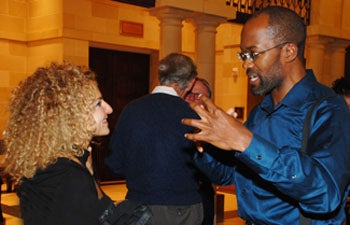Cerebral Cinema
The deadline is fast approaching to sign up for the third annual USC Science Film Competition. To participate, students must register by Oct. 16 — registration details can be found online at sciencefilm.usc.edu.
The event — which unites USC students across the spectrum of majors with the goal of creating films that both educate and entertain — is the brainchild of Clifford Johnson, professor of physics and astronomy at the USC Dornsife.
“The objective is to put science back in the culture where it belongs,” Johnson said. “And film is the most powerful medium we have.”
Each team, which must include students from science-based programs (from USC Dornsife, USC Viterbi School of Engineering or Keck School of Medicine of USC) and film or journalism-based programs (from the USC School of Cinematic Arts or USC Annenberg School for Communication & Journalism), will have four months to produce a film that explains and illustrates a scientific concept, principle or issue for a wide, non-expert audience.
Documentaries are great, Johnson said, but students can also feel free to pursue other genres: romantic comedies, dramas – whatever they like.
The competition will be judged by a jury of USC faculty and outside experts. First prize takes home $3,000, second prize is $2,000, and third prize is $1,000. The films, which tend to be between five and 10 minutes long, will all be screened in a theatre at the USC Cinema School on March 7, when the awards will be announced and handed out.
Both filmmakers and scientists can learn from one another – which is why each team is required to have representatives from both camps, Johnson said.
In fact, students from all areas of study are invited to bring their talents to the filmmaking projects. For example, music on the films must be legally obtained, so students from the USC Thornton School of Music are encouraged to compose and perform music for films.
“Faculty throughout the university — at the School of Cinematic Arts and elsewhere — has been very supportive of this competition,” Johnson said. “Some faculty has allowed students to do films as projects for class credit that can also be entered into the competition while other faculty also see this as an opportunity to have their students showcase work going on in their lab. It has been great.”

Clifford Johnson, professor of physics and astronomy at USC Dornsife, chats with a student during the reception of a previous USC Science Film Competition screening and awards ceremony. Photo by Pamela J. Johnson.
Last year’s winners included A Very Altruistic Christmas, a story about altruism in biology; Stem Cell Billy, an explanation of stem cells; and Cosmic Billiards, a documentary about how astrophysicists chart the course of space probes — likening it to a billiards game.
“You can really see that they had a great time,” Johnson said of last year’s participants. “They reached out of their comfort zone.”
It’s a significant commitment. Although Johnson approves roughly 20 pitches per year, he usually receives eight completed films per year.
To boost retention, this year Johnson is extending the deadline for the completed films to Feb. 15, giving teams an additional month to finish. Another new feature of the competition this year will be a “speed-dating” event where individuals who are interested but perhaps don’t have a team can meet and exchange ideas.
Beyond that, students can email Johnson and he’ll sign them up on the blog to help connect them with a team or with scientific and cinematic resources for putting their film together. Basically, anyone with any interest whatsoever can find a way to participate in this event — Johnson will make sure of it.
Local institutions such as the Griffith Observatory and NASA’s Jet Propulsion Laboratory have been involved in previous years, providing locations and subject matter, and Johnson expects to make contact with them and other city institutions and USC centers for this year’s competition.
“Other than that, I get out of their way,” he said.
If it sounds like Johnson is bending over backward to help encourage participation, he is. This event is a passion project for the renowned physicist, who sees the need for effective and accurate communication of scientific concepts as crucial to modern culture — but often lacking.
Johnson himself is a regular scientific advisor to Hollywood, having been asked for input on The Universe, Sci-Fi Science, Lost, Nova and many others.
“From a pragmatic perspective, a lot of funding agencies are requiring a component about education to the public. We all do this research on behalf of the general public — it only makes sense to explain what we’ve learned to them,” he said.
In a time when government funding is increasingly in danger of being axed, the ability to communicate effectively can translate to job security for a scientist.
In addition, Johnson said it can be disheartening when one realizes how just a little input from a scientist could improve many popular films that deal with scientific principles. “It’s frustrating to see how much better a lot of films could be if that phone call had just been made.”
The event started three years ago with a proposal that Johnson and USC Dornsife Professor of Chemistry Anna Krylov wrote to the Anton Burg Foundation. Burg, a leading expert on boron compounds, was known as “the father of chemistry at USC” and is credited with transforming the chemistry department into a leading research department during the ’40s and ’50s. His namesake foundation has funded the USC Science Film Competition each year.
To learn more about the competition, visit sciencefilm.usc.edu.
Students wanting to enter the contest can connect with other students to form teams at this blog, and they can attend the “speed-dating” event on Oct. 4 at the USC School of Cinematic Arts. Pizza and drinks will be provided. The location is to be determined, but details will be posted on the blog.